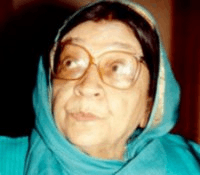Krishna Sobti
| Krishna Sobti कृष्णा सोबती | |
|---|---|
 Krishna Sobti | |
| Born |
18 February 1925 Gujrat Punjab, British India |
| Occupation | Fiction Writer, Essayist |
| Nationality | Indian |
| Notable works | Mitro Marajani, Daar Se Bichchuri, Surajmukhi Andhere Ke, etc. |
| Notable awards |
1999: Katha Chudamani Award 1981: Shiromani Award 1982: Hindi Academy Award 2000-2001: Shalaka Award 1980: Sahitya Akademi Award 1996: Sahitya Akademi Fellowship |
Krishna Sobti (Hindi: कृष्णा सोबती; born 18 February 1925) is a Hindi fiction writer and essayist, who won the Sahitya Akademi Award in 1980 for her novel Zindaginama[1][2] and in 1996, was awarded the Sahitya Akademi Fellowship, the highest award of the Akademi.[3]
She is most known for her 1966 novel Mitro Marajani, an unapologetic portrayal of a married woman's sexuality. She was also the recipient of the first Katha Chudamani Award, in 1999, for Lifetime Literary Achievement, apart from winning the Shiromani Award in 1981, Hindi Academy Award in 1982, Shalaka Award of the Hindi Academy Delhi[4] and in 2008, her novel Samay Sargam was selected for Vyas Samman, instituted by the K. K. Birla Foundation.[5]
Considered the grande dame of Hindi literature,[6] Krishna Sobti was born in Gujrat, Punjab, now in Pakistan; she also writes under the name Hashmat and has published Hum Hashmat, a compilation of pen portraits of writers and friends. Her other novels are Daar Se Bichchuri, Surajmukhi Andhere Ke, Yaaron Ke Yaar, Zindaginama. Some of her well-known short stories are Nafisa, Sikka Badal gaya, Badalom ke ghere. Sobti Eka Sohabata includes her major selected works. A number of her works are now available in English and Urdu.[7]
In 2005, Dil-o-Danish, translated into The Heart Has Its Reasons in English by Reema Anand and Meenakshi Swami of Katha Books, won the Crossword Award in the Indian Language Fiction Translation category.[8]
She was offered the Padma Bhushan by the Government of India in 2010, which she declined, stating that, "As a writer, I have to keep a distance from the establishment. I think I did the right thing."[9]

Works
Translations
- To hell with you Mitro! (Mitro Marjani)
- Memory's Daughter (Daar Se Bichchudi)
- Listen Girl (Ai Ladki)
- Zindaginamah -Zinda Rukh (Urdu)
- The Heart Has Its Reasons (Dil-O-Danish)[7]
Novels
- Zindaginama
- Mitro Marajani
- Daar Se Bichchuri
- Surajmukhi Andhere Ke
- Yaaron Ke Yaar
- Samay Sargam
Short Stories
- Nafisa
- Sikka Badal gaya
- Badalom Ke Ghere
- Bachpan [short story]
Further reading
- Indian Women Novelists, edited by R.K. Dhawan. New Delhi, Prestige Books, 1995, (18 Volms.) ISBN 81-85218-40-4. (Vol. XVII, 10-12)
References
- ↑ Sahitya Akademi Awards Archived 4 July 2007 at the Wayback Machine. Sahitya Akademi Award Official website.
- ↑ Krishna Sobti at The Library of Congress
- ↑ List of Fellows Sahitya Akademi Award Official website.
- ↑ Profile www.abhivyakti-hindi.org.
- ↑ Vyas Samman for Sobti’s novel Samay Sargam The Hindu, 1 February 2008.
- ↑ Uniquely Sobti The Hindu, 18 Sep. 2005.
- 1 2 Author page
- ↑ Another award in her kitty The Hindu, New Delhi, 29 March 2006.
- ↑ "Look who declined Padma Bhushan this year: two giants of art, literature". Indian Express. 9 February 2010.
Works online
- The Moving Finger - Story
- Ai Ladki - Story
- Krishna Sobti works in Hindi, at The Library of Congress
- Phone Baj Raha Hai - Memoir (Hindi)
- Krishna Sobti: Musing on the Creative Process
